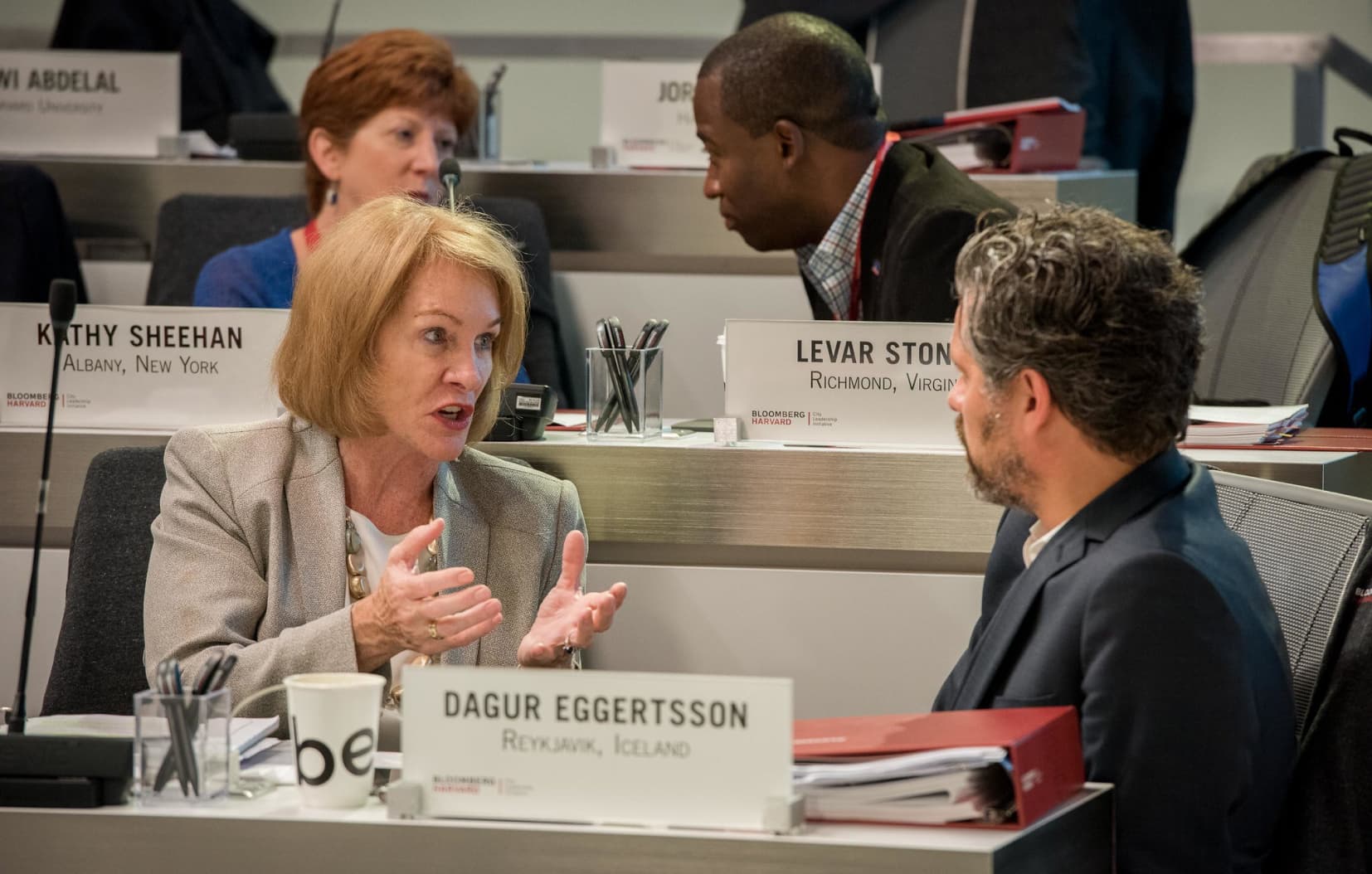On the Front Lines since January, Seattle Mayor Shares Her Take on Responding to an Outbreak

“You will have to make decisions at a pace that is faster than a government is used to traveling.”
Jenny Durkan, Seattle Mayor
In January, Washington State reported the first COVID-19 case in the US, just under 30 miles north of Seattle, the state’s largest city. By February, the first confirmed case was announced in the Seattle area. This year, Washington has reported the most cases and associated deaths in the country. (According to data from Johns Hopkins University, as of March 31, the state had reported more than 5,212 cases and 220 deaths.)
Playing a central role in a leading edge, multi-pronged response is Seattle Mayor Jenny Durkan. On March 16, the Bloomberg Harvard City Leadership Initiative, as part of Bloomberg Philanthropies’ Coronavirus Local Response Initiative, interviewed Mayor Durkan to glean—and amplify—one mayor’s reflection on experiencing a coronavirus outbreak.
The interview presented below has been edited to enhance clarity and reader experience; an organizational chart of Seattle’s Emergency Operations Center can be found here.
Bloomberg Harvard: You were hit early with this crisis. Looking back, what can you tell us about the response?
Mayor Durkan: The public health system wasn’t ready for this. There’s no question that our country was not set up for a pandemic of this size. If the virus has not yet come to you, you should still be testing as broadly as you can, and you should also be ready to limit contact and isolation. By the time you see five cases, there are already more. It’s like an iceberg: you see what’s above the surface, but that mass is growing really quickly. I would urge everyone to assume that if you see the virus in your community, it has spread more than you think it has, and if you don’t see it in your community yet, it is coming.
But no city is going to be able to stand up enough testing without the help of the federal government. I just don’t believe that’s going to be able to happen. Fortunately, I believe the rest of the nation will benefit from the federal government’s failures in the Pacific Northwest: they were not able to stand up testing quickly enough, and the criteria for who they would test was too limited. They will be now implementing nationwide testing, depending on the needs of a community.
Another thing that I think the nation will benefit from is that the federal government now is able to accelerate the manufacture and distribution of personal protection equipment: masks, gloves, and the like. In the early days, that is a critical flow that you need to keep your eye on—for each one of these systems, if any one of them fails, the whole system fails.
Bloomberg Harvard: Who are the key people on your emergency response team, and how often do you communicate with them?
Mayor Durkan: Within my cabinet, I’ve set up a sub-cabinet working group for those departments. Obviously, that’s your fire and police chiefs, but it’s also my head of HR (so I know what’s happening for our city employees), and our facilities and building people, because there’s a number of facility issues related to this—from opening and closing, to, “How do you clean when there’s a positive COVID employee who reports to work?” It also includes utility workers. You’ve got to keep the power on and keep your public utilities for garbage and sewer and water running.
Then we have our operations center, with representatives from all of the key agencies—fire, police, utilities, Seattle Department of Transportation, which is roads and transit, and everyone needs to keep their lawyers close in case you have to declare emergency powers quickly, and also because a thousand issues have arisen that no one anticipated.
We designated my fire chief as the main emergency operations person, because he’s already tied in, through the first responder network, to the healthcare response. He was able, for example, over the weekend, to do a domain assessment of all the first responders in the region, to determine what our needs were for personal protection equipment, and roll those up so that we can give them to the governor, and the vice president, and others, as we needed to have those replenished quickly. In almost every town or city, our medics are that first line that respond to emergencies, and they are both a good barometer of what’s happening in the community, and they’re also already tied into our health networks.
We also have our budget people in the room, and also my deputy mayor staff has been critical. We’ve separated the workflows among each of them, but I have three deputy mayors, each of them is in the room, or coming in remotely, so that we can get reports up from all the systems that are important to the city, both operation-wise and response-wise, and then report out.
We were originally together 24/7, but now it’s more scheduled, and I still meet daily with my sub-cabinet. And because of social distancing, I now get a daily report from all of the key components.
Bloomberg Harvard: What information are you receiving throughout the day, and how are you receiving it?
Mayor Durkan: At my level, I tend to get a very short one-pager every day, and then at various stages of the day as things roll up, I receive oral reports. Again, it’s seven days a week, multiple times a day. I usually start with a briefing in the morning with the deputy mayor and chief of staff, I have a formal briefing in the mid-day, and then at the end of the day, I’m briefed on where we are. Then there’s usually multiple phone calls, staying in touch with, for example, the governor and the county executive, as well as our healthcare providers, and our external partners.
Bloomberg Harvard: Who else are you communicating with for your response, and what advice can you give around effective communication?
Mayor Durkan: We’re also tied to our county, which has a similar team, as does our state. Then there’s a parallel system with public health. It was really important that we not have a number of siloed systems that were running in different directions.
I also speak with businesses, philanthropies, and others, who are trying to stand up a whole range of systems that our city isn’t doing, and our public schools also are a separate entity. We’re having to connect with them as well.
My advice is that as soon as you can, build that connective tissue, do it, because truly, everyone is responding so quickly, that the first thing that can break down is communication. Without information being readily available to everybody, you can start making uninformed decisions.
Bloomberg Harvard: In terms of the coordination with the state and the federal government, what do you think other mayors should be thinking about in terms of how those groups are working together?
Mayor Durkan: I would say you can’t go it alone, but you also can’t assume that you should wait for anyone else to make the decisions. The pace at which we are making some significant decisions—it’s almost breathtaking. We have had to stand up a series of emergency orders. Everything from closing businesses, to canceling gatherings, canceling every city permit.
You will have to make decisions at a pace that is faster than a government is used to traveling, and you have to do it for your own domain, but in connection with other people. Every city is going to have a little bit different contours of what they need in working, for example, with the governor and the county executive. For example, there’s a statewide mandate now on canceling any gatherings over 50 people. That may be too big for Seattle, so we’re working with our public health colleagues right now to evaluate whether we need to be below that. You need to not only be responsible for what’s happening in your city but also stay really connected with everybody else.
Bloomberg Harvard: For city leaders across the country, whether there are confirmed cases in their communities or not, what would you advise them to do right now?
Mayor Durkan: I would urge that the number one thing that every town and city in this country needs to do right now is restrict gatherings. It’s hard, it’s not who we are, we’re moving into spring, but the number one thing that is going to help is for people to stay home and not be in public spaces. We will take huge economic hits for that, but what we’re trying to do is flatten the curve. Every time people get together, you have the chance for transmission.
The good news about this virus is that probably the majority of the people who are affected will recover, but the number of serious cases is significant. If they all happen at once, our hospital system will not be able to withstand it. By reducing that transmission, we may extend the period of time that we’re in this health emergency, but we’ll be able to weather the storm because our hospitals will be able to handle it. We’ve seen what’s happened in Italy and other places. By the time you see it, it’s almost too late. Take the steps now. I would so much rather, at the end of the day, be criticized for doing too much, than letting it grow out of control.
Bloomberg Harvard: What has been your strategy for communicating with the public?
Mayor Durkan: I think you need constant and consistent communication and to be transparent. People are scared, confused, and getting mixed messages from the national and local level. I think people will trust their local leaders. You have to be transparent about the seriousness of the situation and how difficult it is—and is going to get—but you also have to do it in a way that does not create panic.
It’s also going to be really important for people to strike a balance between being open and letting people know what the facts are, and not just tell people what they have to do. They have to know and understand why they have to do it. I would also say that at the beginning, we did not understand the extent of it, but we quickly did.
You have to communicate through every channel you have and coordinate with the state and local partners. Again, the one voice is so important. People get their information now through so many sources. We put things out to the mainstream press, we do it through social media, and we do it through broadcast journalism, TV, and radio. We’re also going to start PSAs.
I think that it’s surprising to me that even now, it’s just starting to hit people how significant this event is, and how dislocating it will be for them and their families.
Bloomberg Harvard: In terms of personal well-being, for both yourself and your staff, what are you doing for your well-being?
Mayor Durkan: That is a really hard one, but it is critically important, not only for our team, but for our cities. We have moved to a much more remote work system, but the core team is still coming in. We’re putting in place a rotation, so even among the core team, people are going to be sent home for a day or so. It’s not possible to disconnect completely, but we have to make sure people stay rested, and they’re connected with their own families, who are worried.
We also need to think about our residents and our citizens. We’re at the stage of the crisis where we’re just closing things down, and trying to preserve the public health response, but it’s not just about meals, nutrition, and survival. We’ve got to be thinking about those things that can preserve the human element. What can keep people engaged and entertained? Frankly, I think one thing others can be thinking about is if there is a way to have a website where people can just click on a daily basis and get either their prayer or their meditation or their yoga, or a range of other activities.
Some of that will be organic, people will do it for themselves because we have very vibrant online communities. But many people don’t take care of themselves. And we are usually the worst at that. We take care of everybody else first, and so I think having some place where someone can just get in a routine taking care of themselves is going to be really important to getting through this.
Bloomberg Harvard: In closing, what would you like to say to other city leaders?
Mayor Durkan: You can’t act quickly enough. We think we acted really quickly. Within a week or two weeks, we were taking important steps, but we needed to act yesterday. Take a domain assessment and work with locals. There is no doubt that it is hard. As I said to the governor, there are no good choices, but there are good decisions. This time is going to be a very difficult time, and it’s going to turn up first in every local community. Be ready, be vigilant.
I would also say that the other part is the economic part—it is going to be even more significant than we anticipated. We have to not just be thinking about how you help people today, but have a group that is thinking about recovery. Because we’ll come out of this, but how we come out of it is going to rely on all of the planning we’re doing today.


